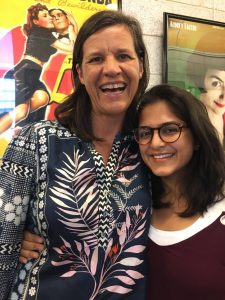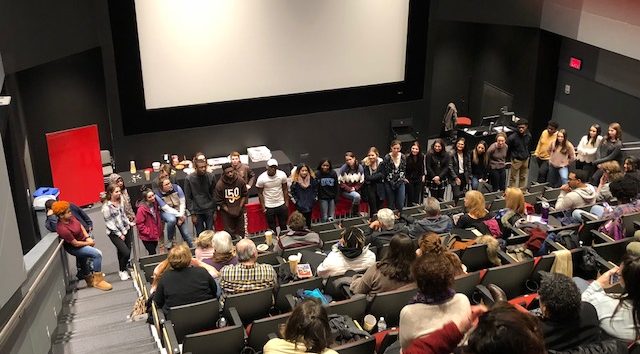I think this past Monday will remain as one of my most memorable days in my life. I also think that this one blog post will not do justice to my experience with Kirsten Johnson. I feel very lucky that she chose to add some more sparkle to our Lafayette film community. Last Sunday, I remember bumping into any friend and telling them how they should attend the Cameraperson screen downtown. I was extremely excited after KJ’s visit because as some of you may know, Cameraperson was the only random documentary I chose to watch one sad Saturday night. When I think back to that night, I remember that Prof Andy had emailed me saying that I could be part of this documentary filmmaking class. I knew I hadn’t watched many documentaries and wondered what I’d have to add to this class, as having some back knowledge of watching documentaries could help. This summer Saturday night, I was feeling low because I wasn’t enjoying my internship at the bank. Movies and TV shows helped me get through that boring month. I decided to look up, “best movies directed by women” and a page on IndieWire popped up (http://www.indiewire.com/2017/05/best-films-directed-by-women-21st-century-1201830875/). That is the actual page. KJ’s film was ranked at number 23 and it was also a documentary. It was perfect! So there I was, tucked in bed at 3am, with my brains, eyes, and ears about to be blown off by this piece. And it was…
Women In Film Class: I was lucky enough to be in Professor Sikand’s Women in Film class where Kirsten made her first appearance. She led our class in a very unique way by asking us to go around and speak about a time when we felt apart, separate, or different from our family. The way she tackled this was by picking us randomly, not from the start or the end of the table where each student would anticipate when they’d be picked to speak. We weren’t given a minute of heads up time to gather our thoughts as the person before us was concluding theirs. The beauty of her approach forced us to actually listen to our peers and to also think on our toes. This was a powerful listening activity. The concept of thinking on our toes was related to cinema, for instance, when we watch certain movies or hear stories from people we interview, things take a different turn and can tend to throw us off. This was the effect she wanted to leave on us. Moving on, Kirsten said that if we ask X where they’re from, it wouldn’t affect them. But, if we ask Y about where they’re from, they might get pissed. She says that as a questioner, our questions come from a place, a point of view, experience, or lack of experience. We could be hurting someone’s feeling or putting them on defense with our first question to a person. Kirsten emphasized that this is how we learn. Body language and a person’s tone were also two key factors that she and the camera focuses on during interviews. When someone told a story about their childhood, she immediately noticed how the person gripped their hands and could tell how uncomfortable they were talking about this experience. In Cameraperson, we notice how Kirsten focuses on hands, in order to show emotions that words cannot. Another classmate shared an intimate story about her family, and Kirsten noticed the crack in her voice, the sound of shame. She emphasized on how we all can read things from people’s bodies because that is how emotions are expressed. The camera has the ability of looking into people’s private business and seeing things that people will not share. These small moments happen and they pass, but it is the camera that holds on to them and makes them true. When interviewing, “dig deeper,” she says. Relating to Cameraperson, Kirsten did dig deeper, especially when she rushes to film her emotional friend who was coping with her mother’s death. Essentially, we became Kirsten’s interviewees and she showed us how she is able to read people through these small yet important details.
Visual workshop + Q&A : A comment that stuck out to me was how KJ said that documentaries reduce one person to one part of the story/a category/a victim/a narrative. If we interview Jane on sexual abuse, to us we only identify Jane to that one topic she’s talking about. She is nothing more to us because nothing more is told about her. As a documentarian, it is a challenge for us to portray someone for the person they really are. We are easily able to be unethical and disrespectful to our interviewee in post, but it the director’s choice to determine how the interviewee is portrayed.
Another thing she said a few times was, “own your advantages, use your sexuality.” Kirsten shared her personal story about how her height was always critiqued on as she was growing up. But, in her career, she used her height to intimidate those who underestimated her. Her comment reminded of the alumni panel lunch when Ayesha said that she uses her sweet smile and soft voice to be able to get an interview with some government official. Ayesha said that someone else in her workplace tried to get an interview but their efforts were in vain. This was rewarding and a positive way of using her sexuality to her advantage. It can be intimidating to be a woman in the film/media industry, but this piece of advice stood out to me from both talks.
She also emphasized on how our stories don’t need to be a narrative. Her documentary wasn’t three act structure, it was put together the way she and her editor thought would do justice to her 25 years of filming. It will allow the audience to feel things, rather than be told. I later had asked KJ a question: It surely takes time for your interviewee to get comfortable with you and the camera. When you initially talk to your interviewee, do you ask them the same questions like you do in front of the camera or do you ask them random stuff to get to know them? She stared at me and said, it’s different with every person. There is no formula and you have to trust your gut. Every experience is different, but make sure to get to know your interviewee.
In my WIF class, I heard a lot personal stories. KJ said that we don’t even realize how good we’ve had it. Everything is part of a system, it is connected to history and to a system that has been deeply unfair. We all experience different things. After watching Cameraperson, I felt grateful for what I have. After hearing my peers open up to KJ in our class safe space, I felt even more grateful. I still have a lot more to share about my experience of just being around her, but I think I learned so much about why being a documentarian, a filmmaker, a scholar, and just being human a human who listens is so important. I still remember how excited I was at this hour last week, unable to sleep because of my excitement to see KJ. I was still unable to sleep after seeing her on Monday night, and she has left these sparkles of excitement in me. Below is KJ and I( awkwardly holding back my tears).

